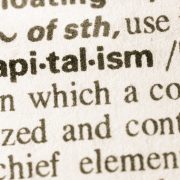Can capitalism survive?
No, I do not think it can.
So wrote economist Joseph Schumpeter, in Capitalism, Socialism, and Democracy. His argument in support of this opinion is complex and multi-layered, and in this post we will concentrate on just one of its elements: capitalism’s self-destructive embrace of its intellectual enemies.
Capitalism Delivers All The Benefits Of Modern Civilization.
Schumpeter points out that all the features and achievements of modern civilization are, directly or indirectly, the products of the capitalist process. Capitalism is the rationalization of human behavior, producing the mental attitude of modern science (the kinds of questions we ask and how we go about answering them) and a suite of rewards to give the best brains the will to apply themselves towards success by following the scientific method of economics.
He explores a long list of applications of the scientific method, starting with airplanes, refrigerators, television “and that sort of thing”. But also hospitals (even if “not for profit”) and the medical profession, pursuing victories over disease.
There is also, says Schumpeter, capitalist art and the capitalist style of life. He talks about painting and about democracy and social legislation. Feminism, he also avers, is “an essentially capitalist phenomenon”. Pacifism and modern international morality are products of capitalism.
Capitalism educates its own anti-capitalist intellectuals.
Yet, says Schumpeter, capitalism, unlike any other type of society, creates, educates and subsidizes a vested interest in social unrest. This vested interest is The Intellectuals.
Intellectuals are people who wield the power of the spoken and written word, and they do so with an absence of direct responsibility for practical affairs, and of first-hand knowledge of them that only experience can give. Over history, societies have not been able to bring them to heel or to discipline them effectively or even significantly.
Capitalism produced institutions that are uncongenial to the required control. The intellectual group lives on criticism that stings, and, without constraint, where nothing is sacrosanct, will eventually issue criticisms of the very foundations of capitalism.
What forces produce these intellectuals? Higher education increases the supply of people who see themselves as intellectuals, and, since many of them are effectively unemployable, they become disgruntled about their place in society. When they do find employment, they may feel that the conditions are sub-standard, in terms of the wages and rewards they receive compared to the most successful entrepreneurs. The intellectuals acquire a discontented frame of mind, and become resentful. Resentment rationalizes itself into the social criticism of the economic spectator. This, in turn, creates a hostile atmosphere surrounding the engine of capitalism, even while that engine is raising the quality of life for everyone.
What makes the situation worse is that the intellectuals “staff political bureaus, write party pamphlets and speeches, act as secretaries and advisers, (and) make the individual politician’s ..reputation”. By so doing, they “impress their mentality on almost everything” in politics.
Moreover, “in times of rapid expansion of…public administration”, staffing comes directly from the intellectual group.
Capitalism Fails To Defend Itself.
Why does capitalism fail so badly in defending itself from these intellectual enemies, and in making the positive case for the system that has raised the levels of affluence worldwide so effectively – and in so unprecedented a manner – over the last 250 years?
It is the fault, says, Schumpeter, of the modern executive class. In the early days of capitalism, the leaders were true entrepreneurs: intense, energetic, committed, heroic. The Rockefellers and the Fords had no misgivings about capitalism. They brought the benefits of science, technology and engineering to the masses in the form of light and transportation, and delighted at the transformation of human opportunities. They did not second-guess themselves, or the capitalist system which made their innovations possible.
Now, says Schumpeter, the modern business person, whether entrepreneur or manager, is of the executive type. He or she has the logic of the salaried employee working in a bureaucratic organization. The will to succeed, to fight and to win “is not and cannot be what it was to the individual who knew ownership and its responsibilities in the full-blooded sense of those words”. The modern corporation “relentlessly narrows the scope of capitalist innovation” and will eventually kill it.
The manager also loses the capitalist ethic of working for the future, “whether or not one is going to harvest the crop for oneself”. Entrepreneurial capitalists like Rockefeller and Ford thought deeply about the long-run interests of society, and defended those interests. The managerial business person of today shrinks the time horizon to his or her life expectation.
Schumpeter talks about the anti-saving theories that are “indicative of a short-run philosophy”. He did not anticipate negative interest rates, but he was prescient about the hedonistic mindset that can conceive of them.
Capitalism Gives In To Its Enemies.
The most striking feature of the picture for Schumpeter is the extent to which the citizenry of capitalism, besides educating its own enemies, “allows itself in turn to be educated by them”. They absorb the slogans of radicalism, they seem willing to undergo a conversion to a creed hostile to their own existence. They concede the implications of the creed. They have insufficient faith in their own creed. “They snatch at compromise; they are ever ready to give in; they never put up a fight under the flag of their own ideals and interests.”
Schumpeter concludes: “there is inherent in the capitalist system a tendency towards self-destruction”. In the early stages, it may show itself as retardation of progress, but will end in the destruction of the capitalist and of capitalism.













